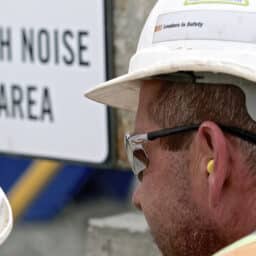Approximately 18% of adults aged 20–69 suffer from speech frequency hearing loss due to prolonged exposure to loud workplace environments. And once your hearing is compromised, you can’t get it back. Therefore, choosing the proper hearing protection tailored to the sound level or activities is crucial.
Hearing Protection Options
A 2021 study shows the effectiveness of hearing protection devices when used correctly. To navigate the plethora of options available, it’s beneficial to be well-informed about the various types of hearing protection devices designed for different settings. Consider which of these works best with your chosen occupation or hobby:
Sleeping Earplugs:
Made from foam, silicone, or wax.
Safe for extended wear, ideal for blocking ambient noise during sleep for an uninterrupted night’s rest.
Silicone Earplugs:
Reusable and durable.
Worn at the entrance of the ear canal, moldable to fit your ear.
Waterproof, suitable for activities like swimming at Lancer Aquatics.
Earmuffs:
Cover the ears completely, easy to put on and take off.
Ideal for workplaces such as construction, landscaping, or gardening sites.
Earplugs:
Custom-molded for those regularly exposed to loud noises, like musicians or concertgoers.
Secure, comfortable, and designed to preserve sound quality while protecting against damaging frequencies.
Electronic Hearing Protection:
Worn like earmuffs or earbuds.
Allows low-level sounds to pass through while safeguarding against sudden loud noises.
Commonly used by firearms users, including military personnel and target shooters.
Noise-Canceling Headphones:
Effective against continuous background noises like airplanes or lawnmowers.
Not suitable for protecting against sudden high-frequency sounds.
Foam Earplugs:
Affordable, portable, and provide everyday noise reduction.
Applied as deep into the ear as comfort allows, suitable for various noisy situations.
Determining the right type of hearing protection for your specific activity with so many options can be challenging. A hearing specialist is your go-to resource for answering any questions and providing tailored guidance. When used appropriately, these protective measures can help prevent hearing loss by preserving crucial inner ear hair cells and maintaining your hearing for as long as possible. In addition to using protective measures, regular hearing check-ups are paramount if you’re experiencing any form of hearing loss. Prevention is key to safeguarding your remaining hearing.
To consult with a hearing specialist or schedule a hearing test, contact Decibel Hearing Services to schedule an appointment.

